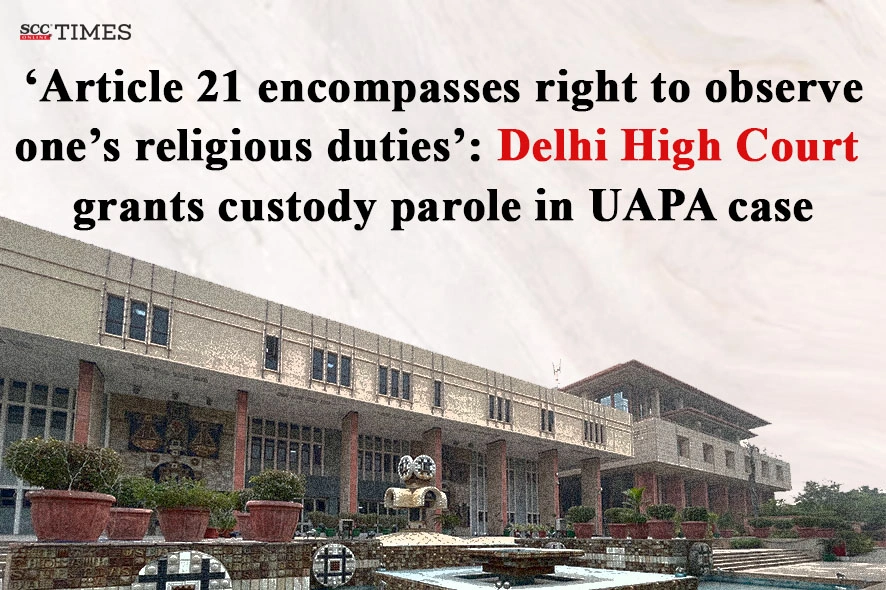Delhi High Court: In a petition filed under Article 226 of the Constitution read with Section 528 of the Bharatiya Nagarik Suraksha Sanhita, 2023 (‘BNSS’) seeking grant of custody parole for three days to attend and participate in the Fathiha ceremony of his deceased mother-in-law, a Single Judge Bench of Ravinder Dudeja, J., held that Article 21 of the Constitution guarantees the right to life and personal liberty, which encompasses within its ambit the right to live with human dignity and to observe one’s religious duties and personal obligations.
Accrordingly, the Court granted the cutody parole and stated that a prisoner, whether convicted or under-trial, continues to enjoy the protection of the fundamental rights guaranteed by the Constitution.
Background
In the present case, the petitioner was charged under Sections 120B and 153A of the Penal Code, 1860 (‘IPC’) and Sections 13, 17, 18, 18A, 18B, 22C, 38 and 39 of the Unlawful Activities (Prevention) Act, 1967 (‘UAPA’) and had been under judicial custody since September 2022.
In 2024, the Sessions Court had rejected his application for custody parole to attend his mother-in-law’s Fathiha ceremony on the ground that her death had occurred about two years earlier and no prior request for such permission was made. Further, no material was placed to show that his personal presence was indispensable for performing the said ceremony. Aggrieved by the same, the petitioner approached the High Court.
The petitioner contended that the Fathiha ceremony was an Islamic prayer and commemorative ritual for the deceased which was to be performed in the presence of all close family members and being the son-in-law, he was religiously and culturally obliged to participate and lead the said ceremony.
Per contra, the respondent argued that the case against the petitioner pertained to conspiracy in raising and channelizing funds for the purposes of carrying out unlawful and terrorist activities and propagating a divisive ideology against the Government of India wherein he acted as the Treasurer of the Karnataka unit of the banned organization Popular Front of India. Hence, the application by the petitioner was opposed.
Analysis and Decision
The Court highlighted that it was a well-settled principle of law that a prisoner, whether convicted or under-trial, continues to enjoy the protection of the fundamental rights guaranteed by the Constitution, save to the extent curtailed by the fact of lawful detention. Article 21 of the Constitution guarantees the right to life and personal liberty, which encompasses within its ambit the right to live with human dignity and to observe one’s religious duties and personal obligations.
The Court further specified that the purpose of custody parole is to allow a prisoner to attend to pressing humanitarian or personal obligations such as funerals, last rites, or significant family functions, under strict supervision of the authorities. It is a temporary measure, humane in character, that ensures a balance between the interests of justice and human dignity.
Considering that there was nothing on record to suggest that the petitioner had misused any earlier concession of bail or parole, or that he posed a security threat if escorted under proper supervision, the Court observed that his request was limited to attending the Fathiha ceremony of his deceased mother-in-law which was rooted in his religious and cultural obligation, and the duration sought was minimal.
Therefore, the Court allowed the petition and granted the petitioner custody parole for two days, excluding the journey time, to enable him to attend and participate in the Fathiha ceremony of his deceased mother-in-law at his residence. Further, the Court directed the jail authorities concerned to ensure adequate security measures while taking the petitioner for custody parole and to coordinate with the local police station and NIA for ensuring law and order situation and to take suitable measures to ensure that petitioner does not flee away during custody parole.
[Shahid Nasir v. National Investigation Agency, 2025 SCC OnLine Del 7107, decided on 15-10-2025]
Advocates who appeared in this case:
For the Petitioner: Adit S Pujari, A Nowfal, Mohammad Annus, Shereef K.A., Md. Arif Hussain, Manvendra Singh Sekhawat, Sanu Mohammed, Advs.
For the Respondent: Rahul Tyagi, SPP




